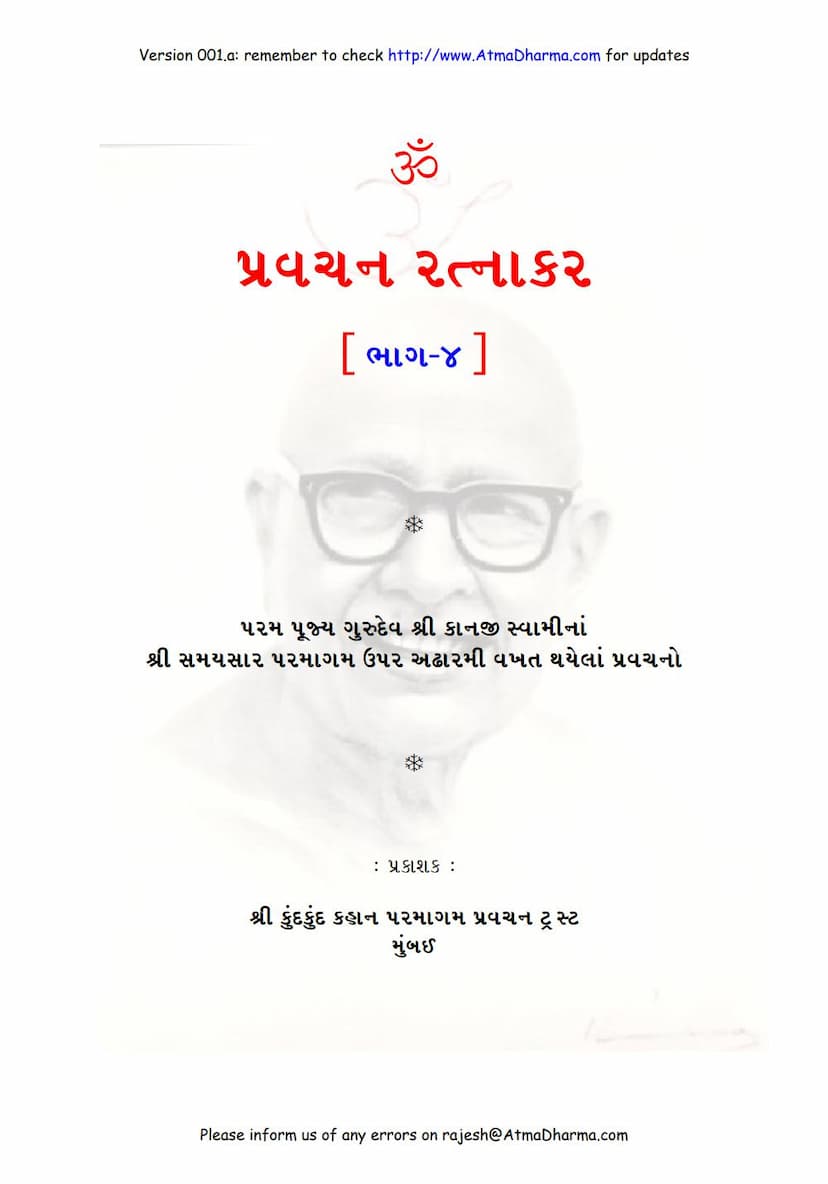Pravachana Ratnakar 04
Added to library: September 2, 2025

Summary
Certainly! Here's a comprehensive summary of the Jain text "Pravachana Ratnakara 04" by Kanjiswami, based on the provided pages:
Book Title: Pravachana Ratnakar 04 Author: Kanjiswami Publisher: Shri Kundkund Kahhan Digambar Jain Pravachan Trust, Mumbai
Overview:
Pravachana Ratnakar Bhag 4 is the fourth volume in a series that compiles the discourses of the revered Jain saint, Gurudev Shri Kanji Swami, on Acharya Kundakunda's profound work, the Samaysar Paramagam. This volume specifically focuses on the eighteenth series of discourses delivered by Gurudev Shri Kanji Swami on the Samaysar, covering the period of 1975-1977.
The text begins with acknowledgments and an introduction highlighting the immense contribution of Gurudev Shri Kanji Swami to the Jain community. It emphasizes how his clear and consistent elucidation of the core principles of Jainism, as found in the Paramagamas, revitalized the faith and provided a correct perspective for understanding these complex scriptures. His ability to explain subtle philosophical points with clarity, even in the face of opposition, and his profound compassion, evident in his calling everyone "Bhagwan," are celebrated. The publication of these discourses aims to make the profound teachings of Samaysar accessible to a wider audience, ensuring the preservation and propagation of Jinendra's true doctrine.
Key Themes and Concepts:
The core of Pravachana Ratnakar Bhag 4 revolves around a detailed commentary on Samaysar, particularly focusing on the Kartā-Karma Adhikara (Chapter on the Doer and the Done). Through a series of verses (Gathas) and their elaborate explanations (Vyakhyas), the text delves into fundamental Jain philosophical concepts:
- The Nature of the Soul (Ātmā): The soul is described as intrinsically pure, formless, and consisting of pure consciousness-knowledge-bliss. It is the ultimate reality, untouched by external substances or their modifications.
- Distinction between Soul and Non-Soul (Ātmā vs. Pudgala): A central theme is the meticulous delineation between the soul (Jiva) and non-soul (Pudgala) and their respective modifications. The text emphasizes that the soul is the pure, sentient entity, while karmic matter (Pudgala) is insentient and modifies into various forms of bondage and experience.
- Causality and Action (Kartā-Karma): A significant portion of the text focuses on the concept of causality, particularly in the context of actions and their doers.
- The Soul as the Doer of its Own Modifications: The soul is the doer and experiencer of its own spiritual modifications (paramārtha) like knowledge, bliss, and consciousness. These are its inherent attributes and are considered its own "karmas" in a purely spiritual sense.
- Pudgala and its Modifications: Pudgala, or karmic matter, undergoes its own modifications. These modifications are insentient and are the "karmas" and "vikāras" (karmic processes and their resulting states) in the worldly sense.
- The Soul and Karma are Not Interdependent Creators: A key argument is that the soul does not create or experience pudgala's modifications (like karmic particles), nor does pudgala create or experience the soul's spiritual modifications. The soul's spiritual modifications (like knowledge) are its own, and karmic modifications are inherently pudgala's.
- Naimittika Sambandha (Instrumental Relation): While the soul and karmic matter are distinct and do not create each other's essential nature, there is an instrumental relationship. The soul's deluded passions (like Rāga and Dvesha) are the occasion (nimitta) for karmic matter to manifest as bondage, and the influx of karmic matter (karmodaya) is the occasion for the soul's passions to manifest. However, this instrumental relation does not imply direct causation or shared agency. The soul is the doer of its own consciousness-modifications, while karmic matter modifies itself.
- The Role of Ignorance (Ajñāna): The ignorance of the soul's true nature is the root cause of the misconception that the soul is the doer and experiencer of karmic actions and their results. This ignorance leads to the false identification with non-soully states (pudgala-parināma).
- Distinguishing True Religion (Dharma) from External Rituals: The discourses strongly advocate for understanding the true essence of Jainism, which lies in the soul's pure, unchanging nature. External rituals, good deeds (like charity, penance), and even virtuous passions (like Rāga in devotional practices) are considered impure and not the ultimate path to liberation, as they stem from attachment and are considered vestiges of karma. True religion is the direct experience of the soul's pure consciousness-bliss.
- The Importance of Self-Realization: The ultimate goal is to realize the soul's true nature, to turn inwards and experience the pure, omniscient, omnipotent, and blissful soul. This realization is the path to breaking the cycle of birth and death.
- Critique of Misconceptions: The text addresses and refutes common misconceptions, such as the idea that external actions, karma, or even virtuous passions constitute the path to liberation. It emphasizes that liberation comes solely from the direct realization of the soul's true nature.
Key Sections/Chapters:
The summary indicates a deep dive into specific Gathas (verses) from the Samaysar, with detailed explanations that dissect the philosophical arguments. The emphasis is on establishing the soul's absolute independence and self-sufficiency, not being the doer or experiencer of karmic actions or their results, even though these are instrumentally related.
Overall Message:
Pravachana Ratnakar Bhag 4 serves as a guide to the profound teachings of Samaysar, illuminating the path to self-realization as taught by Acharya Kundakunda and expounded by Gurudev Shri Kanji Swami. It stresses the importance of understanding the soul's true nature, its distinction from karmic matter and other worldly phenomena, and the necessity of shedding all forms of attachment and delusion to achieve liberation. The discourses advocate for a path of introspection and direct experience of the soul's pure consciousness, rather than relying on external actions or beliefs.